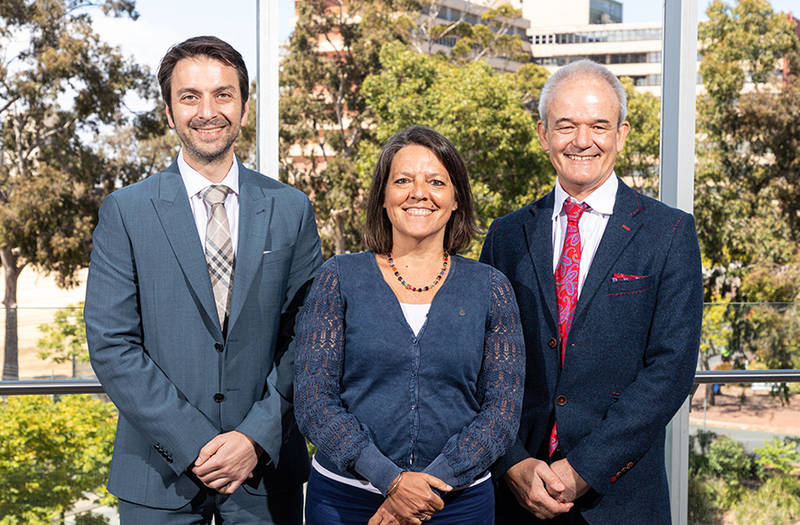$1.7M awarded to ENT Surgery and collaborators for The AIRSPACE Trial

Professor PJ Wormald, Associate Professor Sarah Vreugde, Professor Alkis Psaltis (R-L in photo) and Dr Oveis Pourmehran from ENT Surgery at the BHI, TQEH, and their fellow chief investigators (listed below this article) have been awarded a Medical Research Future Fund (MRFF) grant in the “Rare Cancers Rare Diseases and Unmet Need” category. Their grant (#2014977) which is valued at $1,712,341 will run from 2022 until 2025. It is called The AIRSPACE Trial as it involves “AntI-MRSA PhAge Cocktail treatment via Acoustic Enhanced Nebulisers”.
Staphylococcus aureus (S. aureus, also known as Golden Staph) is a common bacterium that lives on the skin and in some people’s noses and airways. It can cause a range of mild to severe infections, including infections in the context of chronic rhinosinusitis (CRS), a chronic inflammation of the nose and paranasal sinus mucosa affecting around 10% of western populations. CRS is one of the most common diseases for which antibiotics are prescribed, thereby fuelling the emerging antimicrobial resistance crisis. In some cases, the condition does not respond to medical and surgical treatment and is regarded as ‘recalcitrant’ chronic rhinosinusitis or rCRS. This debilitating chronic inflammatory condition causes severe headaches and a reduced quality of life. It is associated with frequent relapsing infections that current treatments are unable to control, let alone cure. As well as affecting the general population, rCRS also affects nearly all people with cystic fibrosis (CF) and can worsen pulmonary manifestations of this disease. CF is a rare, life-shortening genetic disease affecting approximately 1 in 2,500 children in Australia.
Novel, more effective treatments to counter those relapsing infections in rCRS patients are urgently needed.
Bacteriophages (phages) are viruses that target and kill specific bacterial species, leaving the human mucosa and commensal species unaffected. Phage therapy is not a new idea, having been considered as early as the 1920’s. However, it has recently regained global interest for its potential to treat infections with antibiotic resistant pathogens, including MRSA.
Building on promising results of a world-first Phase 1 human clinical trial conducted by our team, this 4-year study, called the AIRSPACE trial (AntI-MRSA PhAge Cocktail treatment via Acoustic Enhanced Nebulisers) will be the first to provide evidence for the potential of a novel bacteriophage cocktail to eradicate S. aureus and methicillin resistant S. aureus (MRSA) infections in rCRS patients that do not respond to existing treatments. The phage treatment will be delivered to the nose and sinuses using a novel device, developed with our collaborators at the Mechanical Engineering Department of The University of Adelaide. The device has the potential to increase the delivery of medications include phage treatments to the sinuses almost 1000 fold, compared to delivery using nasal rinses.
The novel phages were isolated in South Australia by the ENT Surgery research team and characterised in the recently established Adelaide Phage Therapy Centre (APTC). The APTC was established within the Basil Hetzel Institute, TQEH, with funding from AusHealth Corporate Pty Ltd, a company wholly owned by Central Adelaide Local Health Network (CALHN) and the exclusive research commercialisation agent of CAHLN. The APTC aims to make clinical grade personalised phage medicines available to patients and health care providers in Australia and beyond.
This new double-blinded randomised controlled trial will be the first in the world to investigate the real therapeutic potential of phage therapy as a stand-alone-treatment to eradicate difficult-to-treat S. aureus and MRSA sinonasal infections. It provides a unique opportunity for Australians with and without CF who suffer from rCRS with access to a potentially life-changing therapy at the clinical trial stage.
List of Chief Investigators
CIA: Professor PJ Wormald, ENT Surgery, CALHN, The University of Adelaide and BHI, TQEH
CIB: Associate Professor Sarah Vreugde, ENT Surgery, The University of Adelaide and BHI, TQEH
CIC: Professor Alkis Psaltis, ENT Surgery, The University of Adelaide and BHI, TQEH
CID: Dr Sandra Morales, Phage Solutions Pty Ltd.
CIE: Dr Oveis Pourmehran, ENT Surgery, The University of Adelaide and BHI, TQEH
CIF: Professor Ben Cazzalato, School of Mechanical Engineering, The University of Adelaide
CIG: Professor Maziar Arjomandi, School of Mechanical Engineering, The University of Adelaide
CIH: Dr Jennie Louise, Adelaide Health Technology Assessment, The University of Adelaide
CII: Ms Camille Schubert, Adelaide Health Technology Assessment, The University of Adelaide
